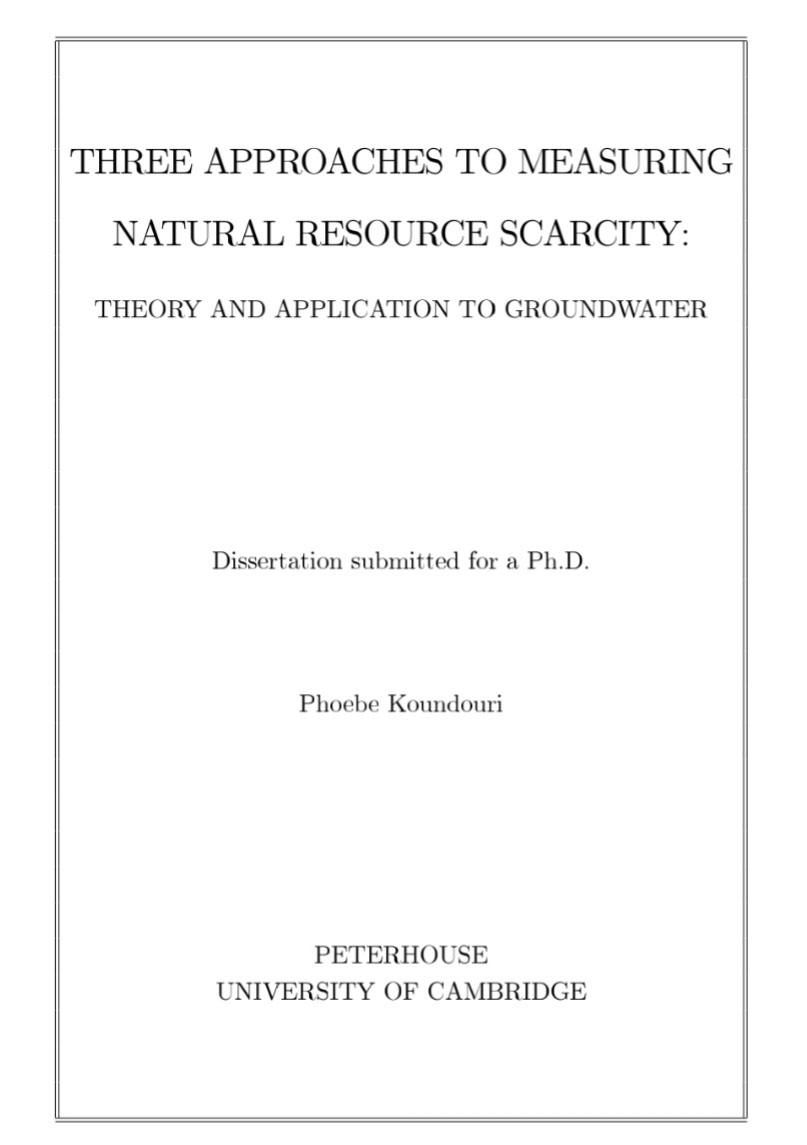
Newsroom
Professor Phoebe Koundouri's thesis, "Three Approaches to Measuring Natural Resource Scarcity: Theory and Application to Groundwater" which was published by Peterhouse of the University of Cambridge, is now available for free on Read Library.
Prof. Phoebe Koundouri is a world-renowned environmental economics professor and global leader in sustainable development. She is widely recognized as a pioneer in innovative, human-centric, interdisciplinary systems for the sustainable interaction between nature, society, and the economy. She is listed as one of the most-cited women economists in the world, with 15 published books and more than 465 published peer-reviewed scientific articles, book chapters and reports.
Born and raised in Cyprus, she studied and worked in the UK from 1991-2006. She subsequently moved to Greece (Athens) and now lives there with her husband, Prof. Nikitas Pittis, and their three daughters: Chrysilia, Billie and Athena.
Prof. Koundouri holds a Masters in Philosophy and a Ph.D. in Economics and Econometrics from the University of Cambridge.
She received a full scholarship from the University of Cambridge and the Cambridge Commonwealth Trust. She then held academic positions at the University of Cambridge, University College of London, University of Reading, and the London School of Economics.
She is currently a University Professor (the university’s highest academic rank) at the School of Economics, Athens University of Economics and Business.
Read more about the author below.
Download the application to mobile and tablets,
for iOS: https://apps.apple.com/us/app/read-library/id763522088
forAndroid: https://play.google.com/store/apps/details?id=com.spp.read&hl=en

Summary:
Efficient pricing of a resource incorporates both marginal costs of extraction and scarcity rents. Since groundwater resources exhibit natural supply constraints, scarcity rents must be imposed on current users. Given the difficulty of establishing clear groundwater ownership rights, scarcity value frequently goes unrecognized and is difficult to estimate. This results in inefficient pricing and misallocation of the resource. This thesis builds on three different methods to develop appropriate theoretical and empirical models relevant for the indirect estimation of these shadow scarcity rents, which we consider as the initial and most challenging step towards efficient groundwater management. Empirical analyses are based on economic and hydrological data from the island of Cyprus, representative of semi-arid regions.
More about Prof. Phoebe Koundouri
Prof. Koundouri is an elected fellow of the World Academy of Art & Science and the President-elect of the European Association of Environmental and Natural Resource Economists for the period 2019-2025 (EAERE) with more than 1200 scientific member institutions, from more than 85 different countries.
In 2020 she received the prestigious European Research Council (ERC) Synergy Grant, which focuses on the design of the next generation of urban water systems, via the combination of water science, systems and control theory, economics, decision science and machine learning.
Currently, this is the biggest research project in the world on urban water systems.
Prof. Koundouri is the Founder and Scientific Director of the Research Laboratory on Socio-Economic and Environmental Sustainability (ReSEES) at Athens University of Economics and Business, focusing on interdisciplinary research on socio-economic and environmental systems. She is also an Affiliated Professor at the ATHENA Research and Innovation Center, where she founded and scientifically directs the Sustainable Development Unit and the EIT Climate-KIC Hub Greece of the European Institute of Innovation and Technology, the latter focusing on accelerating technological and social innovations for use in the transition to a climate-neutral economy. During the period 1991-2006, she studied and held academic positions in the UK.
Prof. Koundouri is also the co-Chair of United Nations Sustainable Development Network (UN SDSN) – Greece & Europe. The leadership of UN SDSN-Europe is constituted from existing National SDSN European networks and its mission is to serve as a science-driven interface with European Commission policymaking.
Prof. Koundouri is also the Chair of the Scientific Advisory Board of the International Centre for Research on the Environment and the Economy (ICRE8) and Chair of the Scientific Advisory Board of the European Forest Institute.
She is one of the Commissioners of the prestigious Lancet Commission on COVID-19 for which she co-chairs the “Green Recovery” Task Force.
She leads the UN SDSN Senior Working Group on “Transformation Pathways for the implementation of EGD and the SDGs”, co-leads the UN SEAs Blue Growth Initiative. She is a member of the CEPR (Center for Economic Policy Research) Network (RPN) on Climate Change, a member of the Priministerial Committee for the Recovery and 10-year Development Plan of Greece, the National Climate Change Committee of Greece, as well as chair or member of numerous European and International Scientific, Research and Policy Boards and Committees.
Prof. Koundouri acts as a scientific advisor to the European Commission, World Bank, European Bank of Reconstruction and Development, OECD, UN, NATO, WHO, World Water Council and various other Multilateral Institutions, as well as numerous national and international foundations and organizations. She also advises national governments across the world. Prof. Koundouri is an editorial board member of more than 20 prestigious scientific journals, including NATURE: Climate Action. Over the last two decades, she has given keynote and public lectures, at high-level forums all over the world, and received various prizes for academic excellence, including best paper awards, highest policy impact paper award, European Research project award.
Since 1997, she has coordinated more than 100 interdisciplinary research projects, in all five continents, focused on combinations of Sustainable Development, Climate Change Mitigation and Adaptation, Behavioural Economics and Econometrics, Economics of Wellbeing and Happiness, Natural Resource-Food-Energy Nexus, Smart Water Systems, Ecosystem Services Valuation, Blue Growth, Circular Economy, Systems Innovation, Innovation Acceleration and Commercialization, and has attracted significant competitive research funding. Prof. Koundouri and her large interdisciplinary team (more than 200 researchers) have produced research and policy results that have contributed to accelerating research and innovation for the enablement of Sustainable Development and have contributed to shaping European and national policies.
































